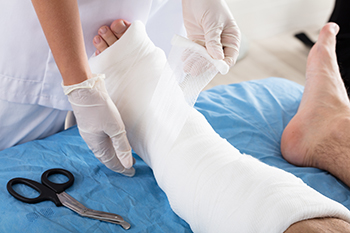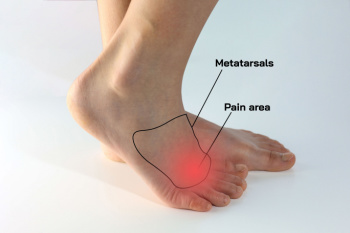

The sport of soccer demands rigorous physical activity that put players at risk of injuries, particularly injuries affecting the lower extremities. Ankle and foot injuries, including sprains, strains, and fractures, are common among soccer players due to the frequent pivoting, cutting, and sudden changes in direction inherent in the game. These injuries often result from player contact, falls, or improper landing techniques. Preventive measures include proper conditioning and gradual intensity progression in training. Wearing appropriate protective gear, including well-fitted shin guards and supportive footwear, is extremely important. Ankle taping or bracing can significantly decrease injury occurrence and recurrence rates. If you have sustained a foot or ankle injury from playing soccer, it is suggested that you schedule an appointment with a podiatrist as quickly as possible for a diagnosis and treatment options.
Sports related foot and ankle injuries require proper treatment before players can go back to their regular routines. For more information, contact Dr. Nooshin Zolfaghari of VIP Foot & Ankle Center. Our doctor can provide the care you need to keep you pain-free and on your feet.
Sports Related Foot and Ankle Injuries
Foot and ankle injuries are a common occurrence when it comes to athletes of any sport. While many athletes dismiss the initial aches and pains, the truth is that ignoring potential foot and ankle injuries can lead to serious problems. As athletes continue to place pressure and strain the area further, a mild injury can turn into something as serious as a rupture and may lead to a permanent disability. There are many factors that contribute to sports related foot and ankle injuries, which include failure to warm up properly, not providing support or wearing bad footwear. Common injuries and conditions athletes face, including:
Sports related injuries are commonly treated using the RICE method. This includes rest, applying ice to the injured area, compression and elevating the ankle. More serious sprains and injuries may require surgery, which could include arthroscopic and reconstructive surgery. Rehabilitation and therapy may also be required in order to get any recovering athlete to become fully functional again. Any unusual aches and pains an athlete sustains must be evaluated by a licensed, reputable medical professional.
If you have any questions please feel free to contact our office located in Pembroke Pines, FL . We offer the newest diagnostic and treatment technologies for all your foot and ankle needs.

For people battling diabetic foot ulcers, a total contact cast can be a game-changer in the healing process. These casts, meticulously crafted to fit snugly around the foot and lower leg, help to distribute weight evenly across the sole, allowing for effective ulcer management and healing. Diabetes often leads to foot problems, like neuropathy, where individuals lose sensation in their feet. This lack of feeling makes it challenging to detect blisters, cuts, or sores, which can quickly escalate into ulcers if left untreated. Total contact casts are primarily recommended for individuals with diabetic foot ulcers that resist conventional treatment methods. A total contact cast provides a protective shield for the ulcer, allowing it to heal efficiently. By reducing pressure on the affected area, these casts promote faster recovery. Typically, most ulcers show significant improvement within six to eight weeks with the consistent use of total contact casts. While wearing a total contact cast, it is important to prioritize its care and adhere to certain precautions, such as keeping it dry, minimizing walking, watching for complications, and managing itching and discomfort. To find out if a total contact cast is an option for treating your diabetic foot ulcer, it is suggested that you schedule an appointment with a podiatrist for an evaluation.
Diabetic foot care is important in preventing foot ailments such as ulcers. If you are suffering from diabetes or have any other concerns about your feet, contact Dr. Nooshin Zolfaghari from VIP Foot & Ankle Center. Our doctor can provide the care you need to keep you pain-free and on your feet.
Diabetic Foot Care
Diabetes affects millions of people every year. The condition can damage blood vessels in many parts of the body, especially the feet. Because of this, taking care of your feet is essential if you have diabetes, and having a podiatrist help monitor your foot health is highly recommended.
The Importance of Caring for Your Feet
Patients with diabetes should have their doctor monitor their blood levels, as blood sugar levels play such a huge role in diabetic care. Monitoring these levels on a regular basis is highly advised.
It is always best to inform your healthcare professional of any concerns you may have regarding your feet, especially for diabetic patients. Early treatment and routine foot examinations are keys to maintaining proper health, especially because severe complications can arise if proper treatment is not applied.
If you have any questions please feel free to contact our office located in Pembroke Pines, FL . We offer the newest diagnostic and treatment technologies for all your foot and ankle needs.
 Morton's neuroma can have a significant impact on athletes, affecting their performance and overall foot comfort. Morton’s neuroma occurs when the tissue around one of the nerves connected to the toes thickens and becomes inflamed. Symptoms of Morton’s neuroma, including pain and discomfort in the ball of the foot, can be exacerbated during activities that involve repetitive stress on the front of the foot, like running or jumping. This is why forefoot pain and Morton’s neuroma are more common in athletes who use those repetitive motions. Athletes experiencing Morton's neuroma may find their agility and endurance compromised. However, there are strategies to manage pain so athletes can continue to exercise. Choosing appropriate footwear with ample cushioning and room for the toes is crucial. Additionally, incorporating orthotic inserts can provide extra support and alleviate pressure on the affected area. Athletes should also consider modifying their training routines to include low-impact exercises and activities that reduce stress on the forefoot. If you have pain in the ball of your foot, it is suggested that you consult with a podiatrist who can locate the source of the pain and provide treatment options for conditions such as Morton’s neuroma.
Morton's neuroma can have a significant impact on athletes, affecting their performance and overall foot comfort. Morton’s neuroma occurs when the tissue around one of the nerves connected to the toes thickens and becomes inflamed. Symptoms of Morton’s neuroma, including pain and discomfort in the ball of the foot, can be exacerbated during activities that involve repetitive stress on the front of the foot, like running or jumping. This is why forefoot pain and Morton’s neuroma are more common in athletes who use those repetitive motions. Athletes experiencing Morton's neuroma may find their agility and endurance compromised. However, there are strategies to manage pain so athletes can continue to exercise. Choosing appropriate footwear with ample cushioning and room for the toes is crucial. Additionally, incorporating orthotic inserts can provide extra support and alleviate pressure on the affected area. Athletes should also consider modifying their training routines to include low-impact exercises and activities that reduce stress on the forefoot. If you have pain in the ball of your foot, it is suggested that you consult with a podiatrist who can locate the source of the pain and provide treatment options for conditions such as Morton’s neuroma.
Morton’s neuroma is a very uncomfortable condition to live with. If you think you have Morton’s neuroma, contact Dr. Nooshin Zolfaghari of VIP Foot & Ankle Center. Our doctor will attend to all of your foot care needs and answer any of your related questions.
Morton’s Neuroma
Morton's neuroma is a painful foot condition that commonly affects the areas between the second and third or third and fourth toe, although other areas of the foot are also susceptible. Morton’s neuroma is caused by an inflamed nerve in the foot that is being squeezed and aggravated by surrounding bones.
What Increases the Chances of Having Morton’s Neuroma?
Morton’s neuroma is a very treatable condition. Orthotics and shoe inserts can often be used to alleviate the pain on the forefront of the feet. In more severe cases, corticosteroids can also be prescribed. In order to figure out the best treatment for your neuroma, it’s recommended to seek the care of a podiatrist who can diagnose your condition and provide different treatment options.
If you have any questions, please feel free to contact our office located in Pembroke Pines, FL . We offer the newest diagnostic and treatment technologies for all your foot care needs.

Pregnancy, a momentous journey marked by various changes, also brings about alterations in the body, including swelling in the feet. This phenomenon, known as edema, is a common occurrence during pregnancy due to increased blood volume and pressure on the pelvic veins. The growing uterus exerts pressure on the vena cava, which hinders blood flow from the lower extremities and leads to fluid retention. Hormonal changes further contribute to this swelling by causing the body to retain more water. To find relief, elevation of the feet whenever possible helps reduce fluid buildup. Supportive footwear and avoiding prolonged periods of standing can alleviate the strain on the feet. Staying hydrated, incorporating gentle exercises like walking, and incorporating a low-sodium diet can also aid in managing pregnancy-related foot swelling. If you have foot swelling or pain in any area of your foot during your pregnancy, it is suggested that you visit a podiatrist who can help you to find additional relief measures.
Pregnant women with swollen feet can be treated with a variety of different methods that are readily available. For more information about other cures for swollen feet during pregnancy, consult with Dr. Nooshin Zolfaghari from VIP Foot & Ankle Center. Our doctor will attend to all of your foot and ankle needs.
What Foot Problems Can Arise During Pregnancy?
One problem that can occur is overpronation, which occurs when the arch of the foot flattens and tends to roll inward. This can cause pain and discomfort in your heels while you’re walking or even just standing up, trying to support your baby.
Another problem is edema, or swelling in the extremities. This often affects the feet during pregnancy but tends to occur in the later stages.
How Can I Keep My Feet Healthy During Pregnancy?
If you have any questions please feel free to contact our office located in Pembroke Pines, FL . We offer the newest diagnostic and treatment technologies for all your foot and ankle needs.